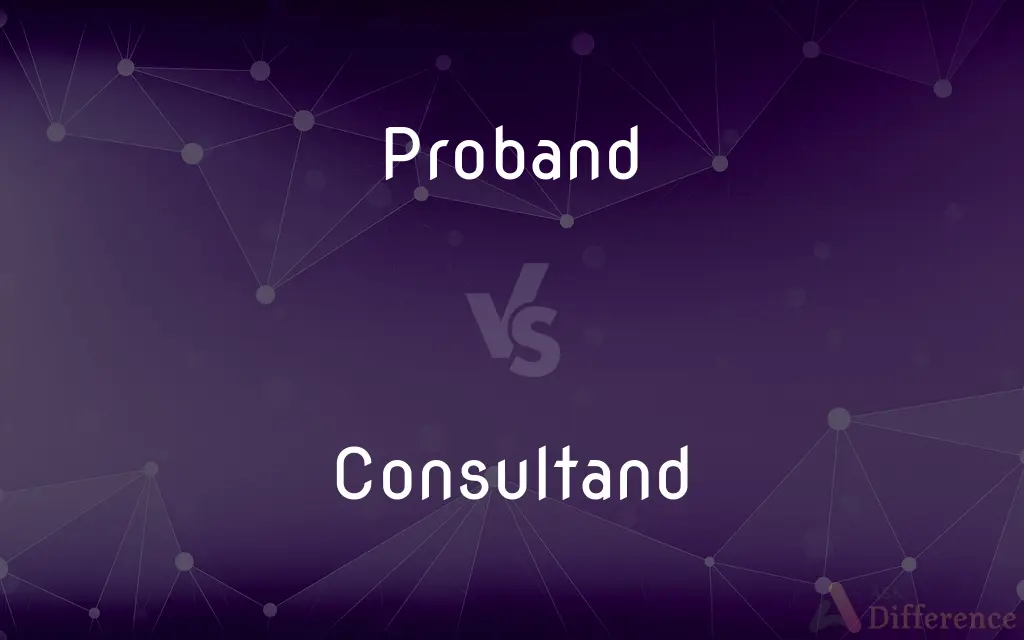Proband vs. Consultand — What's the Difference?
By Tayyaba Rehman & Urooj Arif — Updated on May 6, 2024
Proband refers to the individual in a genetic study from whom the pedigree is traced, typically presenting a specific trait, while a consultand is a person seeking genetic counseling, not necessarily presenting the trait.

Difference Between Proband and Consultand
Table of Contents
ADVERTISEMENT
Key Differences
A proband is often identified in genetic research as the starting point or reference from whom a family's genetic history is traced. On the other hand, a consultand is involved in genetic studies primarily as a seeker of genetic counseling or testing.
The proband is usually selected because they exhibit a particular trait or disease that is of interest in the genetic study. Whereas the consultand might not display any genetic traits but could still be at risk or concerned about genetic issues.
In genetic studies, the identification of the proband is crucial for mapping the inheritance patterns of traits or diseases within a family. Meanwhile, the consultand may seek information about their genetic risks, options for family planning, or understanding potential genetic disorders.
While probands are central to the data collection and analysis in genetic research, consultands might not directly contribute to the data but receive information and guidance based on available genetic data and research.
The role of the proband is typically passive in terms of the research goals, as their genetic makeup is studied. Conversely, the consultand takes an active role in seeking advice and making informed decisions based on the genetic information provided.
ADVERTISEMENT
Comparison Chart
Definition
An individual from whom a pedigree is started.
A person seeking genetic counseling.
Role in Genetics
Subject of study.
Receiver of information.
Contribution to Study
Provides genetic data through their traits.
Seeks information, may provide family history.
Relationship to Trait
Exhibits the trait of interest.
May or may not exhibit the trait.
Implication in Research
Analyzed to trace genetic links.
Uses information for personal decisions.
Compare with Definitions
Proband
Proband often denotes the first affected family member who seeks medical attention.
The clinic identified him as the proband after his symptoms were confirmed.
Consultand
Consultands often participate in decision-making about genetic testing.
After the session, the consultand decided to proceed with genetic testing.
Proband
The term proband is used specifically in the context of genetic research.
The geneticist marked him as the proband on the family pedigree.
Consultand
The consultand's role is primarily informative rather than contributive to research.
The consultand was provided with several options after the counseling session.
Proband
In studies, the proband's genetic makeup provides key data.
The proband's DNA was crucial for the research on hereditary diseases.
Consultand
A consultand seeks genetic counseling to understand potential genetic risks.
As a consultand, he received comprehensive genetic counseling about the condition.
Proband
A proband can be living or deceased, as long as the genetic trait can be traced.
Although deceased, her grandfather was listed as the proband in the study.
Consultand
Consultands may not show any symptoms but seek information due to family history.
She visited the genetic counselor as a consultand worried about her future children.
Proband
A proband is the family member through whom a genetic study is initiated.
In her family's genetic study, Jane was the proband because she had the rare genetic disorder.
Consultand
A consultand can be anyone considering or undergoing genetic testing.
As consultands, they were guided through the process of prenatal screening.
Proband
In medical genetics and other medical fields, a proband, proposito (male proband), or proposita (female proband) is a particular subject (person or animal) being studied or reported on. On pedigrees, the proband is noted with a square (male) or circle (female) shaded accordingly.
Consultand
A person who requests a consultation, especially concerning genetic counseling
Proband
See index case.
Proband
An individual who presents with a genetic disorder or other specific characteristic, when this leads to the investigation of the individual's family
Common Curiosities
How is a proband identified in a study?
A proband is typically identified as the first person in a family who is diagnosed with a genetic condition or who seeks genetic testing.
Can a proband be healthy?
Generally, a proband is not healthy as they are the individual affected by or showing symptoms of the genetic condition in question.
How does the role of a consultand differ in genetic counseling?
Unlike a proband, a consultand's main role is to provide detailed family history to help identify others at risk rather than being the primary subject of study.
What information does a consultand provide?
A consultand provides detailed information about the health and genetic conditions of family members, which is used to assess genetic risks.
How are probands and consultands used in genetic linkage studies?
Proband is used to establish the presence of the genetic trait or disease in a family, while consultands help in mapping the genetic inheritance by providing additional family data.
What ethical considerations are there when dealing with probands and consultands?
Ethical considerations include informed consent, confidentiality of genetic information, and the potential psychological impact of genetic findings.
How do the roles of proband and consultand affect genetic counseling outcomes?
The proband’s information helps in diagnosing and understanding the genetic disorder, whereas the consultand's information aids in risk assessment for family members.
What is a proband?
A proband, in genetic research, is the individual from which a pedigree is initiated, often the first affected family member who seeks medical attention for a genetic disorder.
Is a consultand always a family member of the proband?
Yes, a consultand is usually a family member who may or may not be affected but can provide valuable family health history.
Why is the identification of a proband important in genetic research?
Identifying a proband helps in tracing the inheritance pattern of genetic disorders within a family, crucial for diagnostic and research purposes.
What is a consultand?
A consultand is a person who provides information about their family's medical history during genetic counseling but is not necessarily the affected individual.
Can the roles of proband and consultand change over time?
Yes, as more family members may undergo genetic testing and new information may emerge, the roles and relevance of proband and consultand can evolve.
Can a proband also be a consultand?
Yes, a proband can also serve as a consultand, especially if they are providing information about their own genetic conditions along with family history.
Is the information from a consultand as critical as that from a proband?
Yes, information from a consultand is crucial as it helps in completing the family health picture and can reveal patterns not apparent from the proband alone.
Why might a genetic counselor need to distinguish between a proband and a consultand?
Distinguishing between them helps tailor counseling strategies, as each has different needs and contributions to the family's genetic understanding.
Share Your Discovery

Previous Comparison
Spacecrafts vs. Spacecraft
Next Comparison
Humanely vs. HumanlyAuthor Spotlight
Written by
Tayyaba RehmanTayyaba Rehman is a distinguished writer, currently serving as a primary contributor to askdifference.com. As a researcher in semantics and etymology, Tayyaba's passion for the complexity of languages and their distinctions has found a perfect home on the platform. Tayyaba delves into the intricacies of language, distinguishing between commonly confused words and phrases, thereby providing clarity for readers worldwide.
Co-written by
Urooj ArifUrooj is a skilled content writer at Ask Difference, known for her exceptional ability to simplify complex topics into engaging and informative content. With a passion for research and a flair for clear, concise writing, she consistently delivers articles that resonate with our diverse audience.
















































